![[Top 10] Darkest Dungeon Best Stress Relief That Are Excellent Top 10 Best Stress Relief Skills in Darkest Dungeon](/sites/default/files/styles/responsive_image_600xauto/public/2022-08/darkest_dungeon_top_d_artwork.jpg.webp?itok=LSupwIKE)
It's not easy slogging through deep, dank, dangerous dungeons full of horrendous beasts while the world is falling apart at the seams.
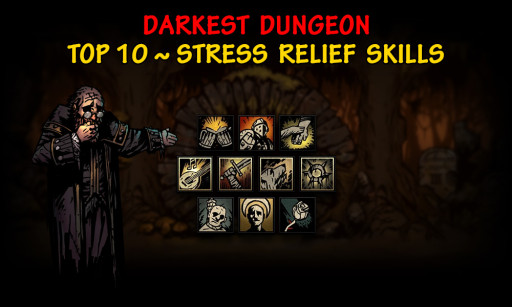
No matter how brave or stalwart your heroes may be, such trials and tribulations are bound to take a mental toll, eventually.
If you find your not-so-merry band of misfits on the verge of cardiac arrest every time danger farts in their general direction, then it may be time to learn how to soothe and steady their scattered nerves.
Thankfully, stress-relieving skills are abundant – both in combat and at camp – and we're about to tuck into the Top 10 best of the bunch.
#1 – | Inspiring Tune
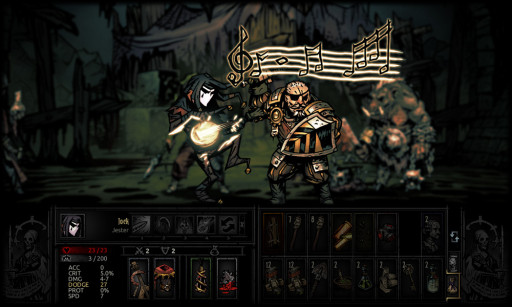
The mention of stress in Darkest Dungeon will inevitably lead to conversations about the Jester. After all, he has been hailed as the undisputed king of stress healing for years – and rightly so.
On paper, Inspiring Tune is one of the most potent single-target stress heals you can deploy in combat, and if that wasn't awesome enough, it also provides a (stackable) stress-reducing buff to the target. As a bonus, Jester is one of the fastest heroes in the roster by default, ensuring that both components of Inspiring Tune arrive early and often.
As a result, he chops down stress meters like twigs, and the buff it places on allies will ensure that any additional intake - be it a stress nuke or stray chip damage - will be passively reduced by a sizeable amount.
#2 – | Inspiring Cry
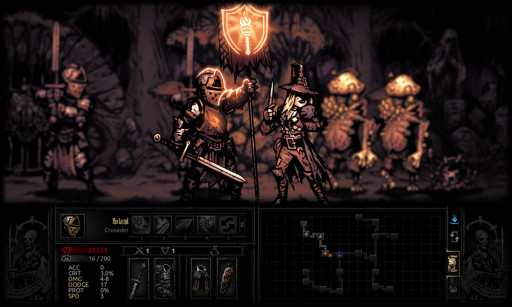
It doesn't matter if you play your Crusader as an up-front stun-bot, a mobile back-liner, full-on support, or a flexible filler. When it comes to crunch time, they can use their Inspiring Cry from any position, and therein lies its core value.
The raw numbers of Inspiring Cry won't rock the planet, but it does provide a complimentary heal (and raises the torch to boot). If the heal component happens to crit, that will increase the strength of the stress heal further, and you'd be surprised how much gold, inventory space (and stress) you can save thanks to Crusader's keeping the dungeon well-lit and not having to fuss over their position.
Despite being slower than snails with arthritis, their teamwide value often overshadows the lower potency of their stress heals, not to mention their humble collection of handy support-based trinkets.
When the poop hits the deck during combat, nothing can compare to a Jester's Inspiring Tune - but when you want a solid alternative with team-building flexibility, Crusaders are great gap-filling generalists, ready to shower you with inspiration.
#3 – | Cry Havoc
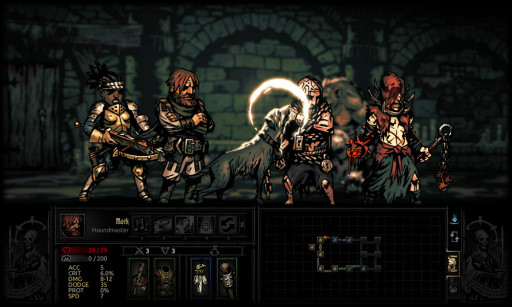
Speaking of generalists, did you know that the Houndmaster's Cry Havoc heals more stress (on average) than everyone else?
Unfortunately, it is RNG dependent, making the Houndmaster (as a stress healer) the equivalent of an Occultist (as a healer). Both can outperform their peers when RNG favours them, but they're also capable of healing for nothing at all.
It's not uncommon to see the most stressed hero gaining nothing from Cry Havoc - or the hero with the lowest stress getting healed all the time. Such is the nature of mass-RNG.
However, Darkest Dungeon is a game where you can pick, mix, and blend team compositions as you see fit. Nothing is stopping you from complimenting a Houndmaster with self-sustainers or co-support, and as mentioned, he absolutely can outperform everyone else when luck is on their side.
When you want to throw a wide stress-reducing web around the whole team (rather than focus down stress bars individually), the Houndmaster might be right up your alley.
#4 – | Endure
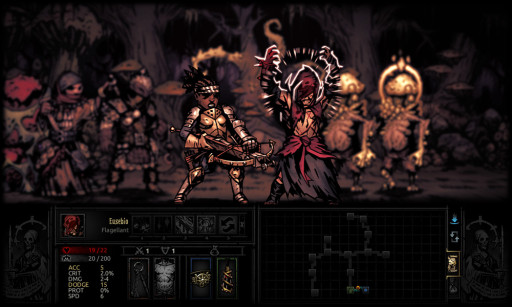
Then we have everyone's favourite self-punishing lunatic, the Flagellant, who stresses himself out whenever he stress-heals allies via Endure.
At max-level with no modifications, Endure heals 14 stress, whereas Inspiring Tune from a Jester heals 12. The kicker is that Inspiring Tune gives stress-reducing buffs, while Endure stresses the Flagellant by +6 per use, slightly diluting its overall value.
Despite the obvious drawback of Endure, it's a surprisingly potent heal that you can cast from any position, also gifting the Flagellant a stackable speed boost as a reward for his self-sacrifice.
It is also worth noting that self-inflicted stress via Endure is prone to being positively and negatively affected by quirks, trinkets, and buffs, which is one of several reasons why a Flagellant pairs excellently with a Jester.
Both can handle stress as needed, both primarily deal damage via bleeds, and the stress-reducing buff of Inspiring Tune lessens the self-stress of Endure. Together, they form a superbly synergistic stress-dunking duo. However, when you need a Flagellant to wing it solo, make sure to ease his burden via stress-reduction trinkets.
#5 – | Feasting
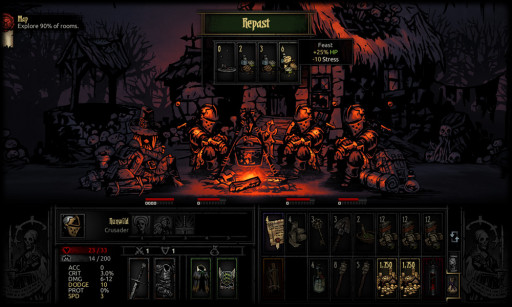
Camping is often one of the most influential moments of a dungeon, allowing you to pick and mix between numerous passive, reactive, and preemptive forms of stress reduction.
When you intend to use a campfire, your first order of business is to decide how many rations the party can enjoy throughout their rest. While it is often a clear-cut choice, it's still a crucial moment.
If you can afford to lavish the group with a Feast, each hero will immediately heal 25% of their maximum health and lose 10 points of stress each. When unmodified by quirks, perks and trinkets, that's 40 (4x10) stress dumped before you even start using your Respite points.
Conversely, players can use trinkets (such as the Fasting Seal or Bloodthirst Ring) to reduce the number of rations required for a Feast, and various quirks and perks - such as healing-received or stress-heal received - will increase the amount(s) restored.
If the feast comfortably resets the party, your respite points can go towards more luxuries and quality of life, such as anti-ambush, scouting, combat buffs, and more. However, if the party is still in dire straights, it may be time for some drastic measures.
#6 - | Every Rose Has Its Thorn
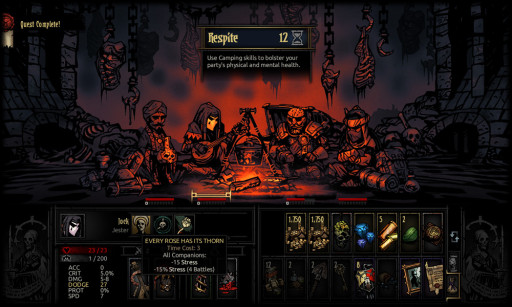
Every Rose Has Its Thorn costs 3 Respite, and the benefits are twofold.
Firstly, it reduces the stress of all companions by -15, for a potential (unmodified) total of 45 (3 x 15). Secondly, all companions receive a buff which reduces further stress intake by 15% for four battles.
Even if your party is relatively stress-free, Every Rose Has Its Thorn is often worth using for the stress-reducing buff by itself. The only downside is that neither component affects the Jester.
#7 - | Zealous Speech
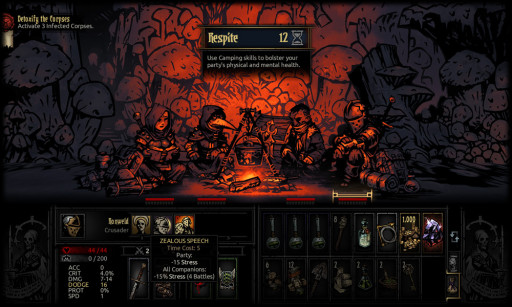
Zealous Speech costs 5 Respite, and the benefits are identical to Every Rose Has Its Thorn, but with a slight twist.
Firstly, it reduces the stress of all party members by -15, for a potential (unmodified) total of 60 (4 x 15). Secondly, all companions receive a buff which reduces further stress intake by 15% for four battles.
Comparatively, the stress-reducing buffs are identical - it's the same 15% reduction for companions only. The main difference is that Zealous Speech includes the Crusader when applying the initial -15 stress reduction.
Ultimately, a stress-free Jester using Every Rose is far more economical than a stress-free Crusader using Zealous Speech, but when the casters require relief too, Zealous Speech can save some hassle.
#8 - | Revel
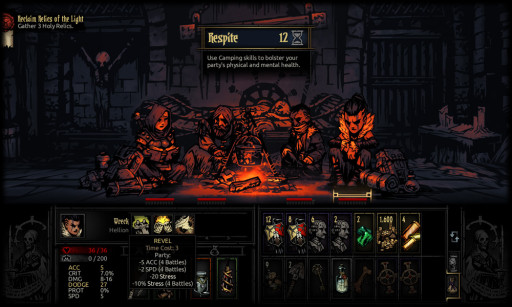
Revel costs 3 Respite, and the benefits are similar to the previously described skills, with a few positive and negative bells and whistles.
Firstly, it reduces the stress of all party members by -20, for a potential (unmodified) total of 80 (4 x 20). Secondly, the whole party - including the Hellion - receives a 10% stress-reduction buff for four battles.
However, that juicy amount of stress healing and reduction doesn't come without a cost, for the entire party shall also receive a -5 ACC and -2 SPD debuff for four battles. Thankfully, you can cleanse the debuff using Medicinal Herbs.
It's a small sacrifice for such a potent skill, though the debuff is quite unpleasant if you can't cleanse it, especially when using unupgraded heroes or lack solid trinkets, so be wary.
#9 - | Gallows Humor
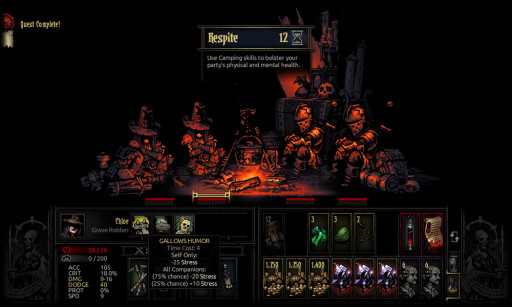
Gallows Humor costs 4 Respite and provides a chunky stress heal for the user, followed by two separate dice rolls for all other companions to determine how much +/- stress they receive.
In summary - the user immediately loses 25 stress, no questions asked. Afterwards, each companion has a 75% chance of losing 20 / and a 25% chance of gaining 10. Depending on RNG, heroes may acquire one effect, or both, or neither of them.
The best case scenario is -25 stress for the user and -20 stress for all companions, for a potential (unmodified) total of 85 (25 + 3 x 20). The worst-case scenario involves the user losing 25 stress while all their companions receive +10.
Due to the variable nature, Gallows Humor works best as a personal stress wipe rather than party-wide management. However, when Lady Luck smiles on you, it can casually chop down multiple stress bars in a pinch.
#10 - | Therapy Dog
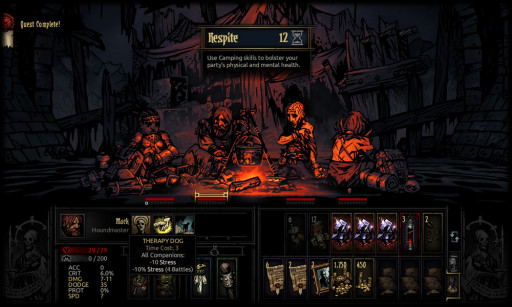
Therapy Dog costs 3 Respite and provides the same benefits as Every Rose Has Its Thorn, albeit with slightly reduced potency.
Firstly, it reduces the stress of all companions by -10, for a potential (unmodified) total of 30 (3 x 10). Secondly, all companions receive a buff which reduces further stress intake by 10% for four battles.
Despite having noticeably lower values when compared to Every Rose Has Its Thorn, -10% stress for four battles across three heroes is still a worthwhile 3-point investment. It is also worth noting that all versions of the buff stack nicely together into a massive anti-stress safety net.
Let's assume you're using a composition such as Vestal, Jester, Houndmaster, and Crusader. How much stress-reduction will the Vestal have if you use Zealous Speech, Every Rose, and Therapy Dog at camp? Answer – a lot! Oh, and that's not accounting for their modifiers, such as stress-reducing quirks and trinkets.
All of which is to say, skills such as these are fantastic, even when you do not require direct stress healing, especially when preparing for stressful bosses and encounters (such as Shield Breaker's snake-themed nightmares).
There are numerous other stress-relieving skills we could mention, but as a general tip - sometimes, the best way to "cure" stress is to avoid taking any in the first place. If you find yourself struggling, consider ways to prevent (or avoid) taking damage from the enemy.
Thanks for reading, and best of luck in your next dungeon!
